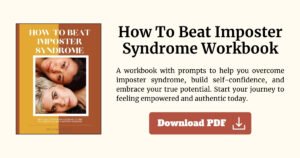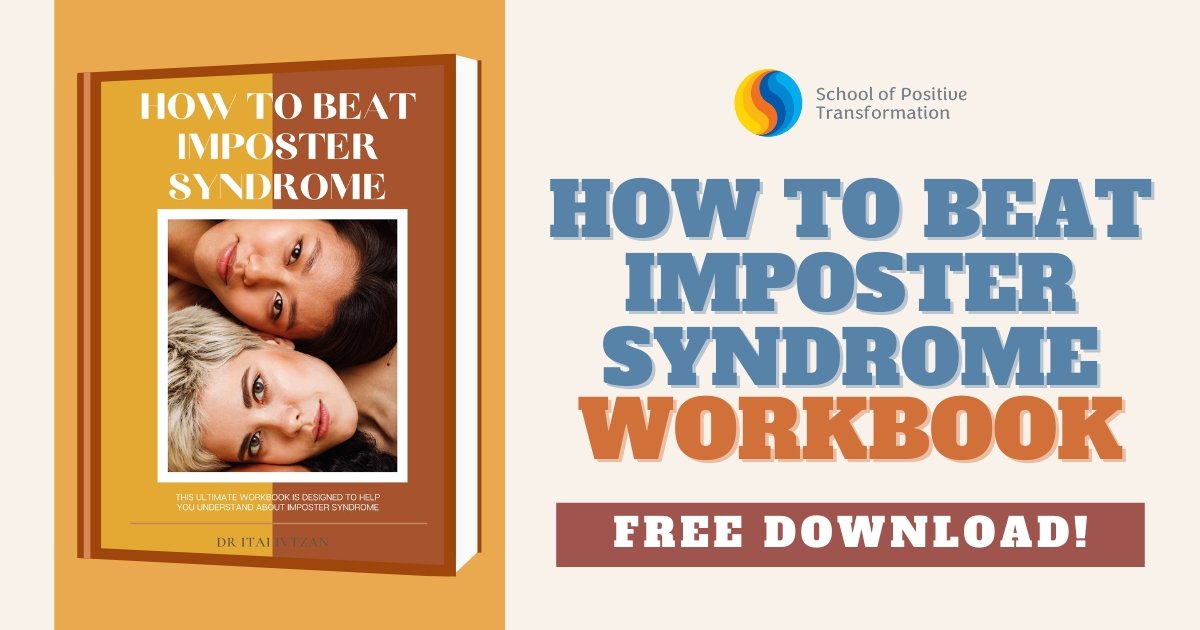Life Coach Certification — Building Self-Confidence Realistically
 Building self-confidence people seem at ease with themselves and their work. They invite trust and inspire confidence in others.
Building self-confidence people seem at ease with themselves and their work. They invite trust and inspire confidence in others.
Self-confidence is how you feel about your qualities, talents, and judgments. Having self-confidence resonates with one’s health and psychological well-being and can help you reach success in your personal and professional life.
But before you continue you might like to consider our free worksheet on exploring “How To Beat Imposter Syndrome”. Please download this worksheet here.
In this article:
How you can benefit from Self-Confidence
Improved performance
Meaningful relationships
An urge to seek experience
Resilience
How to Boost Your Confidence
Stop look at your place from the eyes of others
Pick Positive People
Feel good about yourself by taking care of your body
Practice Self-Compassion
Try Exercising a Positive Self-Talk
Be courageous when faced with things you fear
How you can benefit from Self-Confidence
On my way to getting that coaching certificate I also had to learn how to build my confidence. The following are the benefits of having self-confidence in your daily life:
Improved performance
You perform better because you devote your energy to making efforts. Being confident means you no longer waste your time, energy and thoughts worrying how you’re not good enough.
Meaningful relationships
Having self-confidence not only impacts how you feel about yourself, but it helps you better understand and love others. It also gives you the strength to walk away if you’re not getting what you deserve.
An urge to seek experience
When you believe in yourself, you’re more willing to try new things. Whether you apply for a promotion or sign up for a cooking class, putting yourself out, there is a lot easier when you have confidence in yourself and your abilities.
Resilience
Believing in yourself can enhance your resilience or ability to bounce back from any challenges or adversities you face in life. This topic is also discussed broadly in our life coach certification course.

How to Boost Your Confidence
Fortunately, there are things you can do to boost your self-confidence. Whether you lack confidence in one specific area or struggle to feel confident about anything, these strategies can help. Our life coach certification program has taught us some ways on how to boost confidence.
Stop looking at your place from the eyes of others
Keep in mind that life is not a race, and you need to stop comparing your life with others. Whether you compare how you look to your friends on Facebook or compare your salary to your friend’s income, comparisons aren’t healthy. A study published on 2018 in Personality and Individual Differences found a straight connection between envy and how you feel about yourself. The researchers found that people who looked to others and compared it with themselves felt a sense of envy. As they experienced more envy, the worse that they felt about themselves. Whenever you feel envious of someone else’s life, remind yourself of the strengths you’ve discovered and the successes you’ve had along the way. You can try keeping a gratitude journal to help you focus on your own life and not the lives of others. When you notice yourself making comparisons, remind yourself that doing so isn’t helpful. Think of it, if life was meant to be a race then everyone should have started on the same points and treaded the same tracks and paths.
 Pick Positive People
Pick Positive People
Pay attention to how the people around you make you feel. Do your friends lift you or do they let you down? Do you feel like they are always judging you, or do they accept you for who you truly are? Remember that the persons you spend time with impacts your thoughts and attitudes about yourself more than you realize. If you starting feeling bad about yourself right after spending time with a particular group of people or a person, then maybe it’s time to part ways Keep being around people who love you and want the best for you. 
Feel good about yourself by taking care of your body
Abusing your body can make you feel bad about yourself so it’s best to practice self-care. Caring for yourself makes you feel like you’re doing something positive for your mind, body, and spirit, and that will make you naturally feel more confident. The following are areas that you can focus on to practice self-care Diet: The food that you eat can bring harm or benefits to your body. A good diet can bring you higher levels of self-confidence and self-esteem. By fueling with the right foods, you feel healthier, stronger, and more energized, resulting in feeling better about yourself. Sleep: depriving yourself of a good sleep can take a toll on your emotions. Good, quality sleep on the other hand can be linked with positive personality traits, including optimism and self-esteem. Relaxation: You can practice relaxation through meditation and this can help boost self-confidence in several ways. For one, it allows you to accept and be truly aware of yourself. Meditation also teaches how much control you have because you can stop negative self-talk. It helps you exercise disconnection from any mental chatter interfering with your self-confidence. Exercise: Studies consistently show that boosting physical activity also boosts confidence. A study published on 2016 in Neuropsychiatric Disease and Treatment found that having regular physical activity improved the participants’ body image. And when their body image improved, they had more self-confidence.
Practice Self-Compassion
Be kind to yourself. Self-compassion is about giving yourself kindness when you make a encounter setbacks, mistakes, and when you fail. It’s a way of relating and examining to yourself that allows you to be more emotionally flexible and be able to navigate challenging emotions and enhance your connection to yourself and others. Studies have linked the self-compassion to self-confidence. The Journal of Personality published in 2019 found that self-compassion contributes to more consistent confidence. So the next time you’re in a dire circumstance, recognize that being imperfect or falling short at times is a part of life. Remember to navigate these experiences with self-compassion.
Try Exercising a Positive Self-Talk
Our coaching certificate course has taught us that an optimistic self-talk can help you foster self-compassion, overcome your self-doubt, and helps you easily take on new challenges. On the other hand, negative self-talk can restrain your abilities and lessen your confidence letting your subconscious have a narrative that you “can’t handle this” or that something is “too complicated and hard” and you “shouldn’t even try.” Remember this the next time you think that you can’t speak up in a meeting or that you’re way unhealthy and too out of shape to start working out, remind yourself that your thoughts aren’t always real and accurate. Try to challenge pessimistic self-talk and reframe your thoughts into a more optimistic way through the following:
- Instead of cowering on challenges and telling yourself, “I can’t handle this,” or “This is impossible,” try to have a thought of encouragement for yourself that “You can do it,” or “there’s no harm in trying.”
- Instead of letting off an opportunity just because you think you “hate” it e.g., public speaking, use instead a lighter idea like “don’t like,” and remind yourself you may not be good at it, but that’s life “everyone has strengths and weaknesses.”
- Instead of telling yourself, “I can do nothing right,” when you make a mistake, remind yourself, “I can do better next time,” or “at least I learned something.”
Be courageous when faced with things you fear
We like putting things off when we’re not confident about it (like asking someone on a date or applying for a promotion). The best way to develop your confidence is by facing those fears head-on. Try facing some of your fears that stem from a lack of self-confidence like, applying for a scholarship, a position that’s greater than your current, renegotiation work terms and salary. If you’re afraid you’ll embarrass yourself or think that you’re going to mess up, try it anyway. Remember that the only thing that you miss when you don’t try, is an opportunity to be greater. Tell yourself it’s just an experiment and see what happens. You might learn that being a little anxious or making a few mistakes isn’t as bad as you thought. And each time you move forward, you can gain more confidence in yourself, which in the end, will help prevent you from taking any risks that will result in any significant negative consequences. A major takeaway in our life coach certification program that I remember so fully is that: when you face the things you fear and try difficult things that you’re not used to, you’ll gain confidence in yourself. When you start building self-confidence, you trust your own judgement and abilities, and have a strong sense of self worth and self-belief.
Are you ready to boost your self-confidence and start believing in your true potential? Download our Workbook for free here and begin your journey towards building lasting self-confidence today!






